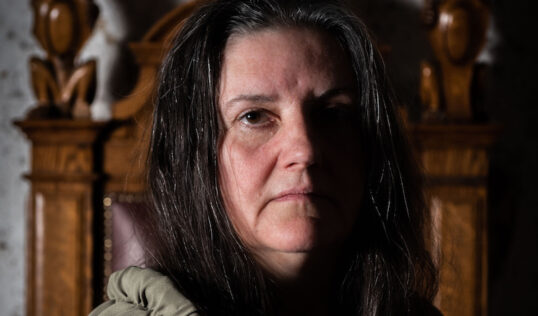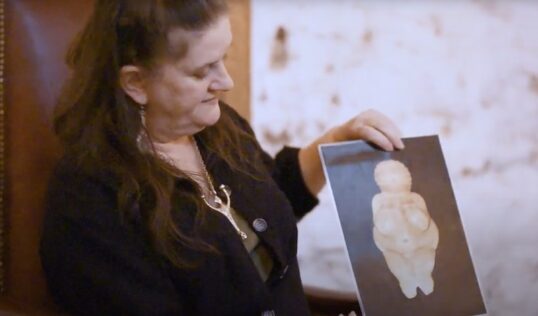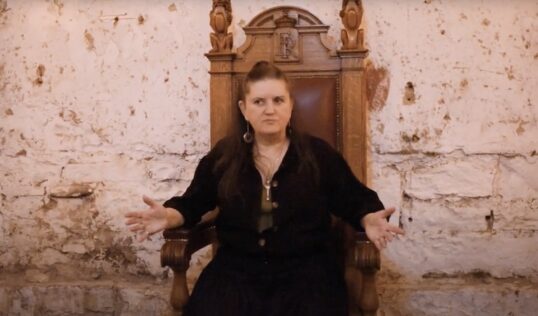Witch? Women on Trial
★★★☆☆ Engrossing
The Lost Close (Venue 236): Thu 3 – Mon 28 Aug 2023
Review by Allan Wilson
Witch? Women on Trial from storyteller Natalie Nardone makes excellent use of a recently opened venue, the Lost Close, deep in amongst the wynds and closes under the houses that once crowded around the Royal Mile.
The venue may be, or is very close to, the site of John’s Coffee House, where David Hume, Adam Ferguson, Adam Smith and other leading figures of the Scottish Enlightenment in the 18th century, came together to discuss and refine their ideas.
The original buildings on the site were lost in the Great Fire of Edinburgh in 1824, but The Lost Close was found under the rubble from the fire during renovations 2019. There is no definitive proof that this is where the Enlightenment philosophers met, but it is certainly a possibility.
Appropriately for a lost venue, the audience meet elsewhere: just off Parliament Square, at the bottom of the steps into Barrie’s Close. The Prison Room, where the show takes place, is a tiny venue with space for just 15 people in benches around the whitewashed stone walls. An ornate, wooden chair sits on the stone floor.
The door bursts open, and our host, Natalie Nardone rushes in, proclaiming in a thunderous voice that ‘In the beginning was the Cailleach…’ After bringing a note of levity by asking if there are any witches present, and suggesting ways they might be identified, she sits and explains in a calmer voice that the Cailleach was regarded as The Great Hag, a personification of feminism.
goddess figures
Centuries ago, women were revered as goddess figures, so how did we get from a situation where almost everybody believed in fairies in the 15th Century to one in which women were being burned for practising witchcraft in the 16th and 17th Centuries?
Wise women and followers of older religions were generally respected until the Reformation and the introduction of a particularly extreme form of Calvinism, which, in turn, led to the 1563 Witchcraft Act, under which people accused of witchcraft could be tortured and burned to death.
The brief history of witchcraft trials in Scotland over, Nardone focusses on the stories of five women from Liberton, from where she also hails, accused of witchcraft in 1661. Their specific cases – why they were accused, their torture, pricking and the final outcomes of their trials – are just indications of the wider witch trials in Scotland. Pricking with a needle, inserted to a depth of just over 2” all over the body, was not legally considered to be torture, even though it could lead to death.
Nardone is a skilled and engrossing storyteller, varying the volume and intonation of her speech to raise and lower the tension in the room. There are times when she is speaking quickly, leaving little space to absorb and reflect on her tale – she admits that she has a lot of material that she wishes to present.
It’s not all stories. Light hearted activities include belly dancing and a re-enactment of part of the wedding of James VI and Anne of Denmark. Belly dancing is regarded as excellent exercise, and is relevant as a descendant of the sensual dances often practised by women prior to the Reformation in Scotland.
Witch? Women on Trial is very different from many of the other storytelling sessions that can be found in the Fringe, but Nardone’s subject matter makes for an entertaining, informative, and occasionally disturbing use of a unique, historic venue.
Running time: One hour (no interval)
The Lost Close (The Prison Room), 1A Barrie’s Close, EH1 1RF (Venue 236)
Thursday 3 – Monday 28 August 2023
Daily (not 14): 2pm.
Tickets and details: Book here.
Website: https://edinburghstorytellers.uk/
Twitter: @StoryEdin
Facebook: @StoryEdin
ENDS





















